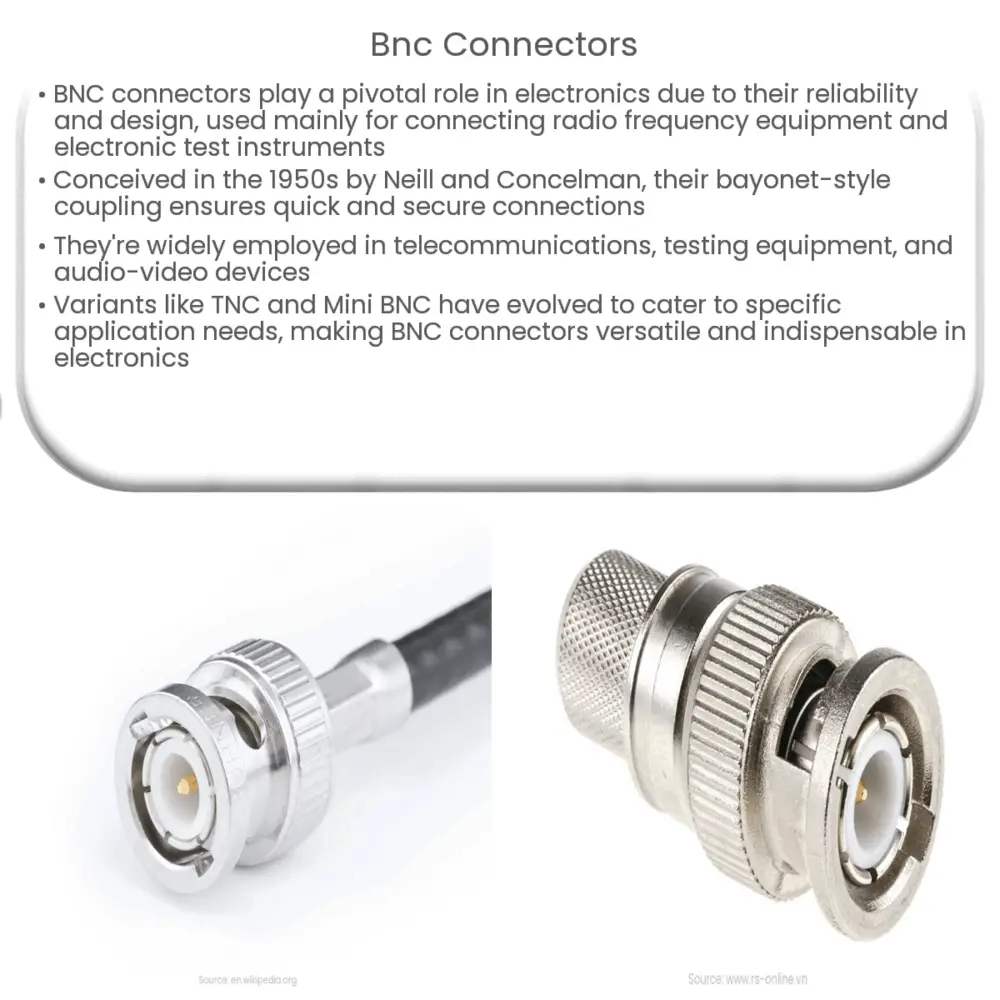Explore the world of BNC connectors, their origins, applications, and variations. Understand why they’re vital in telecommunications, testing, and audio-visual devices.

BNC Connectors: An Overview
The Broadcast Network Connector, more commonly known as a BNC connector, plays a crucial role in the world of electronics. These connectors are specifically designed to connect radio frequency equipment and electronic test instruments, owing to their high reliability and robust design.
Origins and Design
The BNC connector was first conceived in the 1950s by Paul Neill of Bell Labs and Carl Concelman of Amphenol. The term ‘BNC’ is believed to derive from a combination of their surnames (‘Bayonet Neill-Concelman’).
A distinguishing feature of BNC connectors is their bayonet-style coupling mechanism, which enables fast and secure mating. BNC connectors come in 50 and 75 ohm variants, aligning with the needs of different applications. The 50 ohm connectors are primarily employed in data and RF applications, while 75 ohm versions are generally used in video and audio applications.
Applications of BNC Connectors
BNC connectors find a multitude of uses in several different sectors due to their adaptability and durability.
- Telecommunications: Given their ability to handle RF signals, they’re commonly used in telecommunication equipment such as antennas, routers, and radios.
- Test Equipment: They’re used in oscilloscopes and other electronic testing equipment to connect the device under test to the equipment itself.
- Audio and Video: BNC connectors are often seen in audio and video devices due to their superior signal integrity, which reduces the chance of signal loss or interference.
Advantages of BNC Connectors
One of the chief benefits of BNC connectors is their quick connect and disconnect capability. The bayonet lock, as opposed to thread mechanisms seen in other connectors, allows for easy installation and removal, reducing the risk of damage during assembly or disassembly. Furthermore, their strong build makes them withstand harsh environmental conditions, thereby contributing to their longevity.
BNC connectors also excel in maintaining signal integrity. The design of these connectors ensures that they have an excellent shielding against electromagnetic interference (EMI), thereby reducing the chance of signal loss or degradation.
Variants of BNC Connectors
Over time, variations of the BNC connector have been developed to better suit specific applications. These include:
- TNC Connectors: The Threaded Neill–Concelman connector is a threaded version of the BNC connector, providing a more secure connection suitable for high-vibration environments.
- Mini BNC: A smaller version of the BNC connector, Mini BNC is used when space is a limitation. Despite its compact size, it retains the excellent performance characteristics of the standard BNC connector.
- High Voltage BNC (also known as HN Connectors): Designed for high-voltage applications, these connectors are equipped with a more robust dielectric and a larger design to manage the higher voltage levels.
Considerations When Choosing a BNC Connector
Choosing the right BNC connector involves considering factors such as the nature of the application, frequency, and impedance requirements, and environmental conditions. For instance, a 75 ohm BNC connector would be more suitable for video applications, while a 50 ohm connector would be better suited for data and RF applications.
Similarly, for high-vibration environments, TNC connectors might be a better choice, given their threaded coupling. Lastly, the connector materials and finishes also play a role in the connector’s performance, durability, and resistance to corrosion, so these too should be taken into account.
Conclusion
In conclusion, BNC connectors are a versatile and reliable solution for various applications in the fields of telecommunications, test equipment, and audio and video devices. Their unique design and features, including quick-connect bayonet coupling and resistance to EMI, make them a staple in many sectors.
The numerous variations of the BNC connector, from TNC to Mini BNC to High Voltage BNC, enhance the range of its applications and enable it to cater to specific needs, thereby cementing its position as a cornerstone in the world of electronic connectors. Whether for the transmission of RF signals or high-quality video signals, BNC connectors offer a durable and efficient connection solution.




